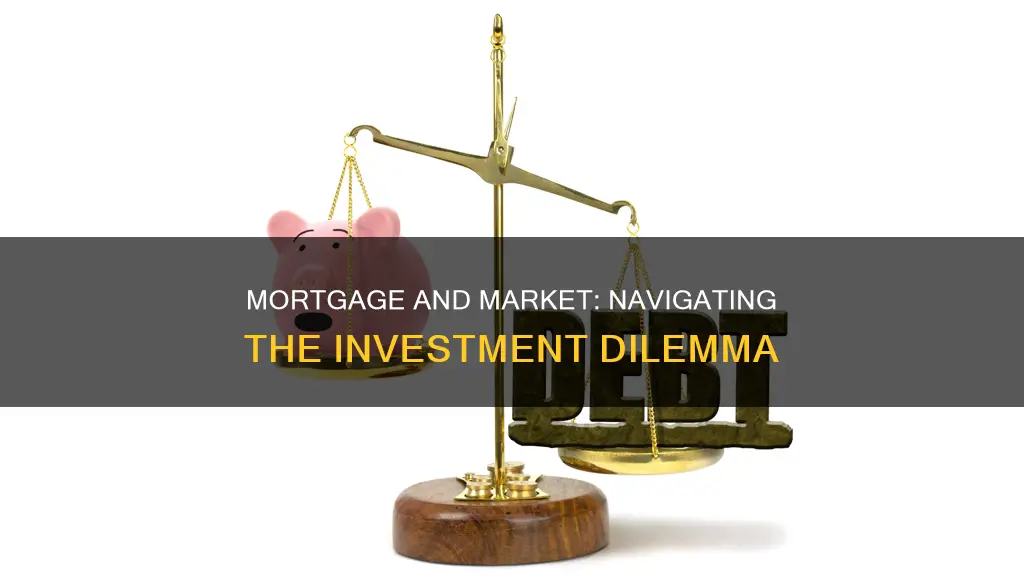
Paying off your mortgage or investing extra cash is a common dilemma for homeowners. While there is no one-size-fits-all answer, there are several factors to consider when deciding what to do with your money. These include your mortgage rate, risk tolerance, expected earnings from investments, and individual financial goals.
Paying off your mortgage early can save you thousands of dollars in interest and provide peace of mind from being debt-free. On the other hand, investing often offers the potential for higher returns, liquidity, and employer-matching benefits.
Ultimately, the decision depends on your financial situation, risk appetite, and personal preferences. Consulting a financial advisor can help you weigh your options and make a choice that aligns with your goals.
| Characteristics | Values |
|---|---|
| Interest savings | Paying off your mortgage early can save you thousands of dollars in interest. |
| Peace of mind | Being debt-free can ease your burden. |
| Build equity | Paying down your mortgage faster means building equity in your home more quickly. |
| Opportunity cost | Any extra money you spend on paying down your mortgage faster is money you aren’t able to use for other financial goals. |
| Wealth is tied up | Property is an illiquid asset, meaning you can’t convert it to cash quickly or easily. |
| Loss of some tax breaks | You will give up tax savings and may lose out on tax deductions for mortgage interest. |
| Higher returns | The average stock market return has been significantly higher than mortgage rates. |
| Liquid investment | Stocks, bonds and other market investments mean you can easily sell and access your money if you need to. |
| Employer match | If your employer offers a match, you get to enjoy compound earnings on your retirement account. |
| Higher risk | There is more volatility in the stock market than in the housing market. |
| Increased debt | Choosing to invest your money may not be the best option if you don’t like the idea of having debt. |
What You'll Learn
- Paying off your mortgage early can save you thousands in interest
- Paying off your mortgage can give you peace of mind
- You can leverage your equity if you pay off a large chunk of your mortgage early
- Investments are typically more liquid than paying off your mortgage
- Paying off your mortgage early may result in prepayment penalties

Paying off your mortgage early can save you thousands in interest
Let's say you have a 30-year mortgage of $200,000 with a fixed rate of 4.5%. Your monthly payments would be $1,013 (not including taxes and insurance), and you would spend a total of $164,813 in interest over the life of the loan. Now, let's say you are able to add an extra $300 per month to your payments. You would cut 11 years and one month from your repayment period and save a total of $67,816 in interest.
The savings are even more significant if you are in the early years of your mortgage. In the first decade of a 30-year fixed $200,000 loan at a 4.38% rate, making 13 payments a year instead of 12 saves you $27,216 in interest overall. If you kicked in an extra $200 per month, you would save $6,000 in 10 years, $50,745 in 22 and a half years, and you would have the mortgage paid off too.
However, it is important to note that there are also potential downsides to paying off your mortgage early. Any money that goes towards your mortgage isn't going towards another financial goal, and you may miss out on tax deductions for mortgage interest. Additionally, the money you put into your mortgage becomes illiquid, meaning it is not easy to access. If you experience a financial emergency and need cash, you may have to sell your house.
Ultimately, the decision of whether to pay off your mortgage early or invest depends on your personal financial situation and risk tolerance.
REITs: A Smart Real Estate Investment?
You may want to see also

Paying off your mortgage can give you peace of mind
You'll be debt-free
Owning your own home and not having to make any more monthly payments can be liberating. Depending on the size of your monthly payments, that's $1,000 or more a month you can now use elsewhere.
You'll save on interest
If you pay off your mortgage early, you can potentially save thousands of dollars in interest you might have paid if you hadn't reduced the principal amount early on.
You can build home equity
Paying off your mortgage will increase the equity you have in your home. You can leverage this equity to take out a home equity loan or home equity line of credit (HELOC) to accomplish other financial goals.
You'll free up funds going forward
If you're no longer making mortgage payments, this money can now go to other causes, like investing in your future or personal hobbies.
However, there are also some downsides to paying off your mortgage early. You could be giving up tax deductions on mortgage interest payments, and your money becomes illiquid—it's not easy to access. Additionally, you might be foregoing higher returns on investments in the stock market.
FTX Investors: Who Got Hurt?
You may want to see also

You can leverage your equity if you pay off a large chunk of your mortgage early
Paying off a large chunk of your mortgage early can be a great way to leverage your equity. Here are some reasons why:
Peace of Mind
If you don't like the idea of being in debt, paying off your mortgage early can ease your burden. You'll no longer have to worry about missing mortgage payments and potentially losing your home to foreclosure in the event of a financial emergency.
Building Equity
Paying down your mortgage faster means building equity in your home more quickly. This can help you qualify for refinancing, which can save you money in the long run.
Leverage Equity
By paying off a large chunk of your mortgage early, you can leverage that equity in various ways. For example, you may be able to take out a home equity loan or a home equity line of credit (HELOC). This can provide you with a source of emergency funds or allow you to make home improvements to increase your home's value.
Freeing Up Funds
Once your mortgage is paid off, the money you were previously using for mortgage payments can be redirected towards other financial goals, such as investing in your future or personal hobbies.
However, it's important to consider the potential drawbacks of paying off your mortgage early. For example, you may miss out on higher returns from other investments, and your wealth may be tied up in your property, making it less liquid and harder to access. Additionally, paying off your mortgage early may result in the loss of certain tax breaks and deductions.
Rich People's Role in Economic Development
You may want to see also

Investments are typically more liquid than paying off your mortgage
The money you put into your mortgage becomes illiquid, meaning it's not easy to access. If you experience a financial emergency and need cash, you'll have to sell your house. Even if you decide to take out a home equity loan or home equity line of credit (HELOC), you'll still be adding to your debt.
With investments, you can sell stocks, bonds, and similar investments to free up cash without losing an asset. This is especially beneficial if you need to pay for an emergency expense.
However, it's important to remember that investments come with risk. The stock market is volatile, and you could lose money. On the other hand, paying off your mortgage early can save you thousands of dollars in interest and give you peace of mind from being debt-free.
Ultimately, the decision to pay off your mortgage or invest depends on your financial situation, risk tolerance, and individual financial goals. Consult a financial advisor to help you assess your finances and make the best decision for your needs.
Investing in Others: A Worthy Bet
You may want to see also

Paying off your mortgage early may result in prepayment penalties
Paying off your mortgage early can result in prepayment penalties, which are fees charged by lenders when you pay off all or part of your mortgage loan ahead of schedule. These penalties are included in the mortgage contract to protect lenders from losing out on interest payments over the life of the loan. While federal law prohibits prepayment penalties for certain types of loans, such as FHA and USDA loans, they are common for other loan types.
There are two types of prepayment penalties: soft and hard. A soft prepayment penalty allows you to sell your home without incurring a penalty, while a hard prepayment penalty applies in the case of refinancing or selling your home. The penalty fee is typically calculated as a percentage of the outstanding principal balance, a fixed amount, or a certain number of months' interest.
To avoid prepayment penalties, it is essential to carefully review the loan agreement and understand the prepayment terms. Additionally, negotiating with the lender to remove or reduce the prepayment penalty clause can be an option. Another strategy is to opt for an open mortgage, which offers more flexibility in making additional payments or paying off the loan early.
When deciding whether to pay off your mortgage early, it is crucial to weigh the potential savings in interest against the possibility of incurring prepayment penalties. It may be more advantageous to wait until the prepayment penalties have phased out or make extra payments that fall within the allowable limits without triggering the penalty.
Paying CKS Prime Investments: A Step-by-Step Guide
You may want to see also
Frequently asked questions
Paying off your mortgage early can save you thousands of dollars in interest and give you peace of mind. You can also leverage your equity to open a home equity line of credit (HELOC) or do a cash-out refinance to make home renovations.
You could cut into your savings and miss out on tax deductions for mortgage interest payments. Your wealth is also tied up in an illiquid asset, meaning you can't convert it to cash quickly or easily.
Investing your extra cash can give you a higher rate of return and increase your future wealth. Your money is also more liquid, meaning you can easily sell and access your money if needed.
Investing is riskier and you will still have to make mortgage payments. You will also not be eliminating your debt.







